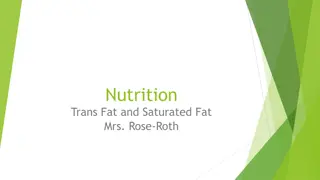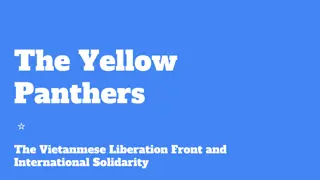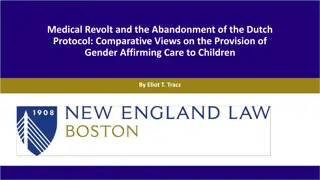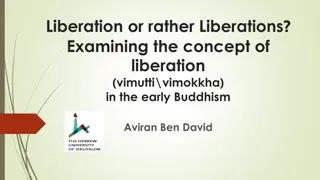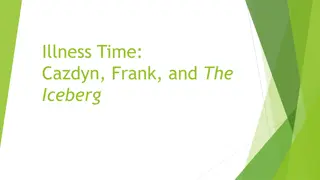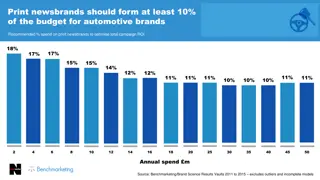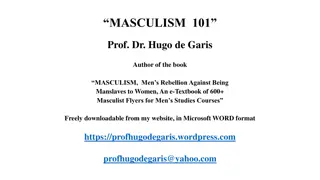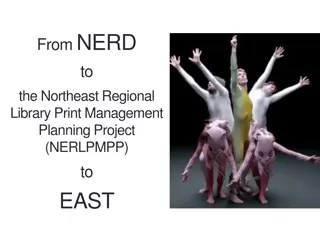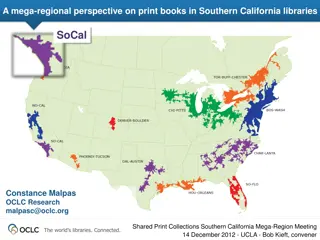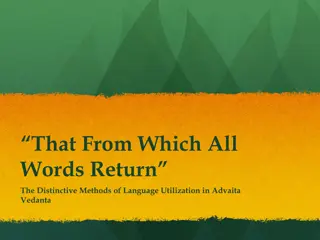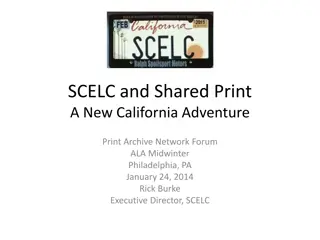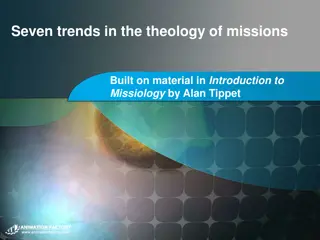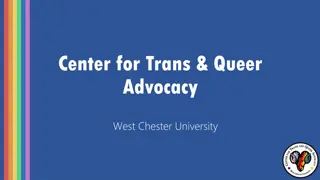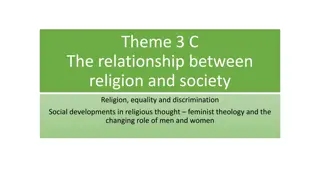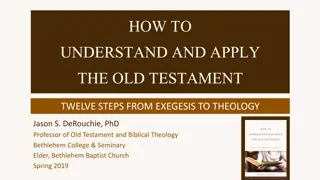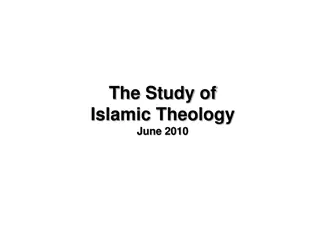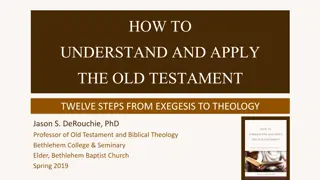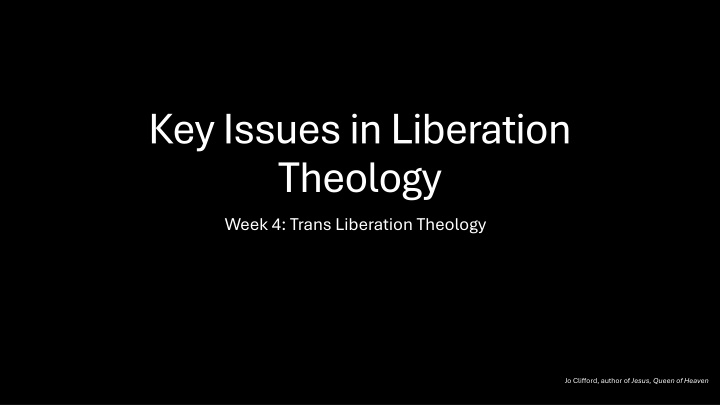
Trans Liberation Theology: Exploring Transness in Catholicism and Beyond
Delve into the realm of Trans Liberation Theology with a focus on the intersection of trans identity within Catholicism. Discover the challenges faced by trans individuals, the pursuit of liberation from societal norms, and the affinity with other liberation movements. Explore critiques of gender clinics, structural inequalities, discrimination issues, and the evolving landscape of public opinion in this discourse.
Uploaded on | 0 Views
Download Presentation

Please find below an Image/Link to download the presentation.
The content on the website is provided AS IS for your information and personal use only. It may not be sold, licensed, or shared on other websites without obtaining consent from the author. If you encounter any issues during the download, it is possible that the publisher has removed the file from their server.
You are allowed to download the files provided on this website for personal or commercial use, subject to the condition that they are used lawfully. All files are the property of their respective owners.
The content on the website is provided AS IS for your information and personal use only. It may not be sold, licensed, or shared on other websites without obtaining consent from the author.
E N D
Presentation Transcript
Key Issues in Liberation Theology Week 4: Trans Liberation Theology Jo Clifford, author of Jesus, Queen of Heaven
Todays session Trans liberationism Transness in Catholicism One of my own papers More than Mercy: Towards a Better Affective Compromise in Catholic Pastoral Approaches to Transness Manuel Salvador Camona, Wilgefortis (Unencumbered Virgin) (18th Century)
Part 1 Trans liberationism
Trans as political affinity Break with individualising, medicalising framing Trans people defined by movement within gender/breaking norms Corresponding experiences of policing Trans liberationism: seeking liberation from the policing and exploitation that attends being trans Shared affinity with other liberation causes E.g. feminism, antiracism, Disability liberation, anticarceral politics, postcolonialism/antimperialism
Why trans liberationism? Originally enabled critique of disciplinary aspects of gender clinic i.e. don t let the clinic define transness; reflect on relationship with the clinic Affinity through policing/social punishment still relevant Structural problems: live in more deprived areas; more likely to be BAME, queer; worse health outcomes (Saunders et al., 2023) Discrimination: 1/3 employers less likely to hire (Crossland, 2018), widespread experiences of discrimination in many spheres (TransActual, 2021) Public opinion has grown worse since (YouGov, 2025); general trends!
Part 2 Transness in Catholicism Pompeo Battoni, Allegory of Truth and Mercy (1745)
General themes: gender theory Modernity involves ideology that subjects nature to human will Exemplified in gender feminism / theory / ideology (see Laudato si , Dignitas inifinita) Sexual nature/sexuality (same thing)/morality is subjective Promoted via ideological colonisation , corruption of children, neglect of parental rights (like sex ed) Normalised via corruption of language Giacomo Balla, Science Banishes Obscurantism (1920)
Transness as gender theory Human nature sexually binary, intrinsically heterosexual A gift must be respected (dignity) Transness rejects this gift/attacks it chooses otherwise Human nature is a unity of body and mind/soul transness subjects former to latter Agnotology Giovanni Bellini, Lament Over the Body of Christ (1500)
A positive dimension Gender theory is ideological colonisation, corruption of human rights tradition etc must be resisted politically But trans people have human dignity must be respected So no persecution etc Also Anti-gender politics are about protecting human nature etc Antigender politics are about celebrating and gratitude for nature The negative aspects are not what it s really about Vladimir Makovsky, Visiting a Poor People (1874)
Part 3 More than Mercy: Towards a Better Affective Compromise in the Catholic Pastoral Response to Transness Elisabetta Sirani, Allegory of Justice, Charity and Prudence (1664)
An affective compromise Bad feelings (affect) about trans re politics; good feelings about trans re people Both animosity (politics) and pastoral responsibility (people) a compromise Transness in people is reduced away to separate out from political (sickness, sin, not really them etc); have to disavow to accept Potential political significance of their transness has to be ignored Positive approach to people disguises way political approach hurts people ( we re just fighting the ideology / we mean well ) Viktor Vasnetsov, Sirin and Alkonost, the Birds of Joy and Sorrow (1896)
Towards a better compromise Goal: way of navigating two affects that offers better pastoral welcome, and does not lead to oppressive politics: 1. Welcome trans people 2. Welcome challenging aspects of transness 3. By finding positive affect in them, so don t have to reduce away/negate/disavow 4. Have negative political affect without turning into harmful politics Salvador Dali, Feather Equilibrium (Interatomic Balance of a Swans Feather (1947)
Utopianism (Jos Esteban Mu oz, 1967-2013) Queer utopian art witnesses to moments of potentiality what could have been/be, glimpsed in the past Positive-affective (hope!) - but through the negative: potentialities show different worlds distinct from the present (critical) emerging within the pain of present conflicts and tensions and as different to painful present i.e. without resolving/negating it
Utopianism in Pope Francis Evangelii Gaudium Time is greater than space (no. 222-225) fulfilment lies beyond the present, outside of our possession; move beyond both Unity prevails over conflict (no. 226-230) fulfilment is unity, communion polyhedral universality (no. 236) communion does not reduce away difference I prefer a Church which is bruised, hurting and dirty because it has been out on the streets (no. 49) Fratelli tutti potentiality of communion: St Francis humble and fraternal subjection (no. 4)
Utopian hope and trans people Welcome in hope as the people in whom communion will be found Positive affect through the negative communion is reached through the encounter with the other (even if difficult) Orients away from oppressive politics self-subjection precludes exercise of power over trans people (legislation etc) Hope can also encompass trans people no longer (supposedly) dominating nature etc But still cannot hope for an oppressive resolution Gustav Klimt, Hope II (1908)
Catholic support for trans liberation Mu oz utopian futures can be enacted i.e. live in a way that witnesses to them Enacting a future in which trans people are not dominated i.e. impulse towards trans liberation despite negative political affect Future is other to present don t need a clear idea of how all the tensions will be resolved, how trans people will provide joy Marc Chagall, Liberation (1937-52)
How is this trans liberation theology? Taking liberationist perspective focus on policing, political repression Advocating for adoption of liberationist perspective - shift perspective from medicalising, individualising view Focus on political liberation (Re)reading Catholic teaching to frame concept of liberation showing how it is Christ s work


